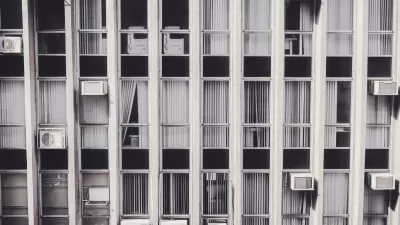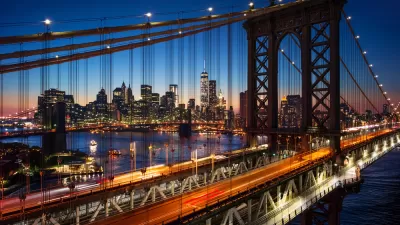Alex Steffen of WorldChanging proposes that globalization could soon change direction as transportation costs increase.
"(T)ransportation costs are not the only reasons why globalization as we know it might be in for some rapid evolution. Consider:"
"-Some of the economic advantages of globalization have come from companies gaining the ability to skirt labor and environmental laws by doing business in countries with high levels of political corruption (corruption they have often helped create). But now, transparency activism has blown the cover of secrecy off these practices; now it is easier than ever to cause enormous brand damage simply by revealing an unsavory backstory.
-Much of the logic of globalization assumes a one-way flow of materials, mined and grown in the poorest countries, manufactured into consumer goods in China, Brazil or Mexico, sold on the shelves of megastores in Europe or North America, then shipped away to the landfill. But as we move into zero waste and closed-loop systems (where there is no "away"), reverse logistics start to become a real concern. Producers become responsible for their products, meaning that running their current supply chains in reverse doubles (at least) their already mounting transportation costs. This alone could drive more local manufacturing.
-Globalization suffers from some big disruptive vulnerabilities. An extreme act of terror, say a dirty bomb in a shipping container, could easily bring the whole system screeching to a halt. Ditto bird flu. Same with mass migrations triggered by environmental degradation and climate change in already desperately poor countries. Heck, even the right kind of invasive species scare could put a hiccup in the system, but some of these could stop trade altogether for quite some time."
FULL STORY: Could Globalization Be Going In Reverse?

Alabama: Trump Terminates Settlements for Black Communities Harmed By Raw Sewage
Trump deemed the landmark civil rights agreement “illegal DEI and environmental justice policy.”

Study: Maui’s Plan to Convert Vacation Rentals to Long-Term Housing Could Cause Nearly $1 Billion Economic Loss
The plan would reduce visitor accommodation by 25% resulting in 1,900 jobs lost.

Why Should We Subsidize Public Transportation?
Many public transit agencies face financial stress due to rising costs, declining fare revenue, and declining subsidies. Transit advocates must provide a strong business case for increasing public transit funding.

Paris Bike Boom Leads to Steep Drop in Air Pollution
The French city’s air quality has improved dramatically in the past 20 years, coinciding with a growth in cycling.

Why Housing Costs More to Build in California Than in Texas
Hard costs like labor and materials combined with ‘soft’ costs such as permitting make building in the San Francisco Bay Area almost three times as costly as in Texas cities.

San Diego County Sees a Rise in Urban Coyotes
San Diego County experiences a rise in urban coyotes, as sightings become prevalent throughout its urban neighbourhoods and surrounding areas.
Urban Design for Planners 1: Software Tools
This six-course series explores essential urban design concepts using open source software and equips planners with the tools they need to participate fully in the urban design process.
Planning for Universal Design
Learn the tools for implementing Universal Design in planning regulations.
Smith Gee Studio
Alamo Area Metropolitan Planning Organization
City of Santa Clarita
Institute for Housing and Urban Development Studies (IHS)
City of Grandview
Harvard GSD Executive Education
Toledo-Lucas County Plan Commissions
Salt Lake City
NYU Wagner Graduate School of Public Service





























